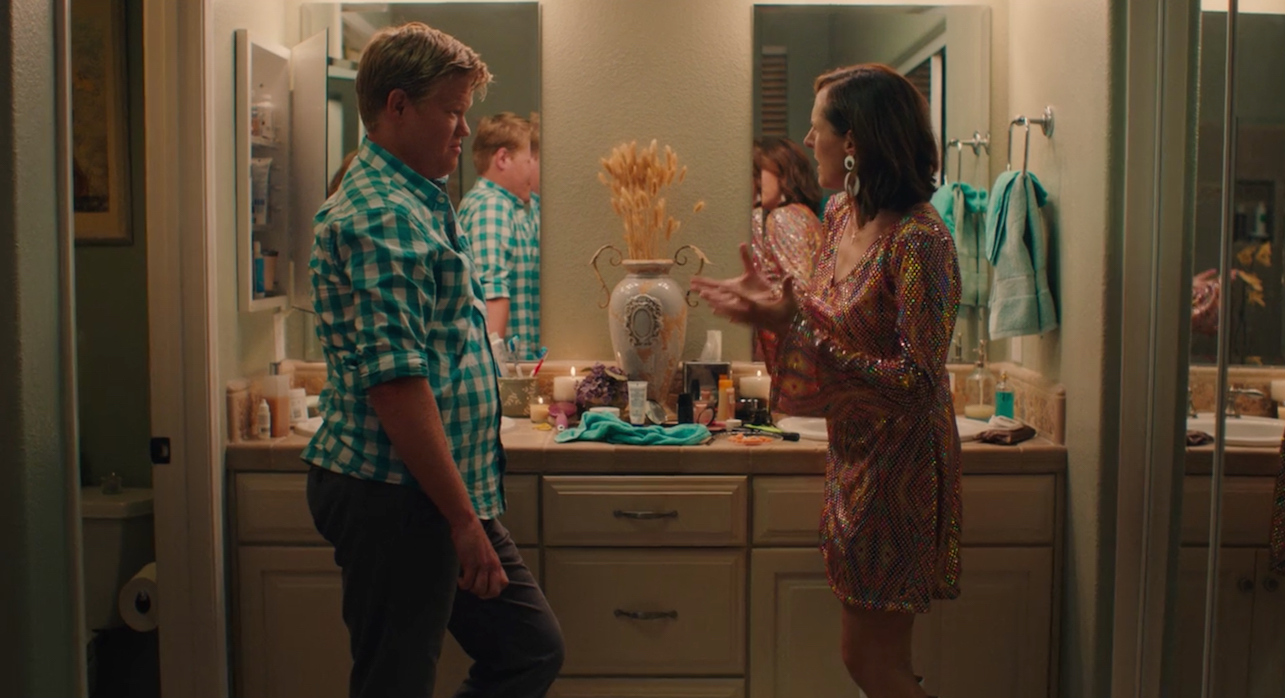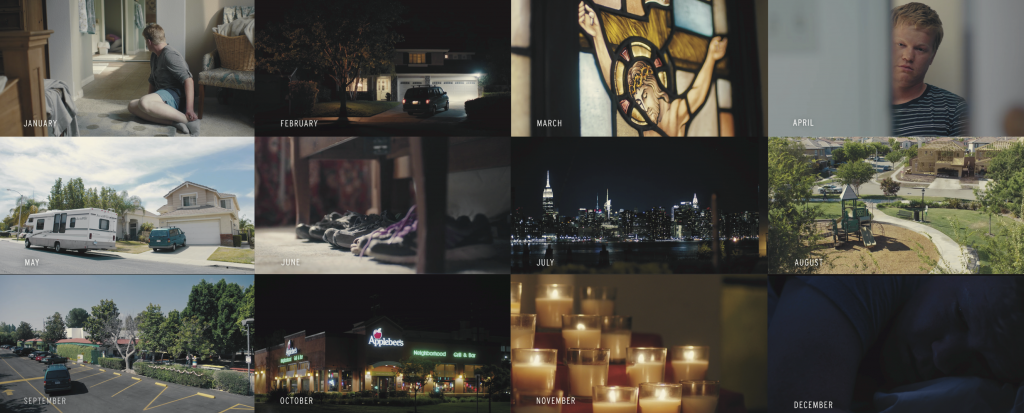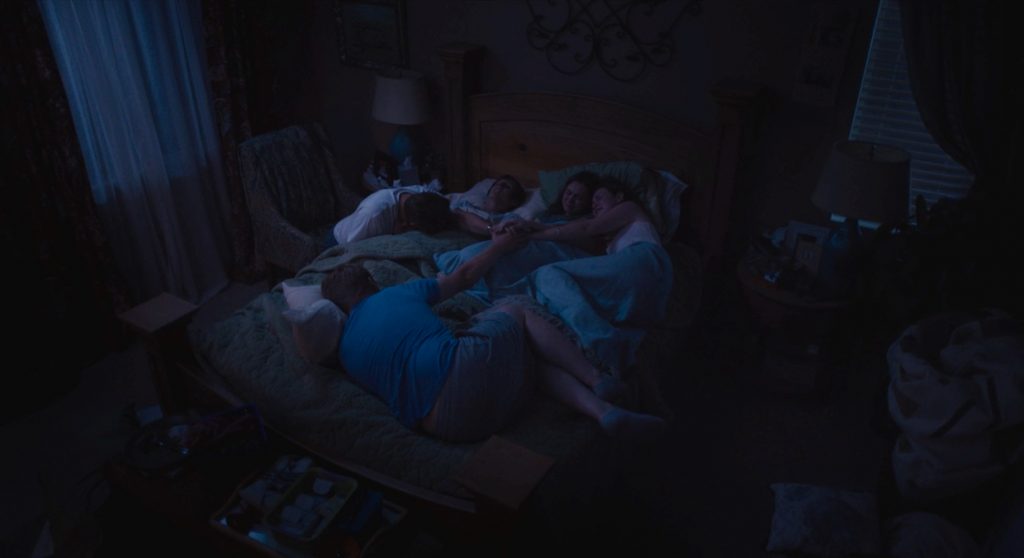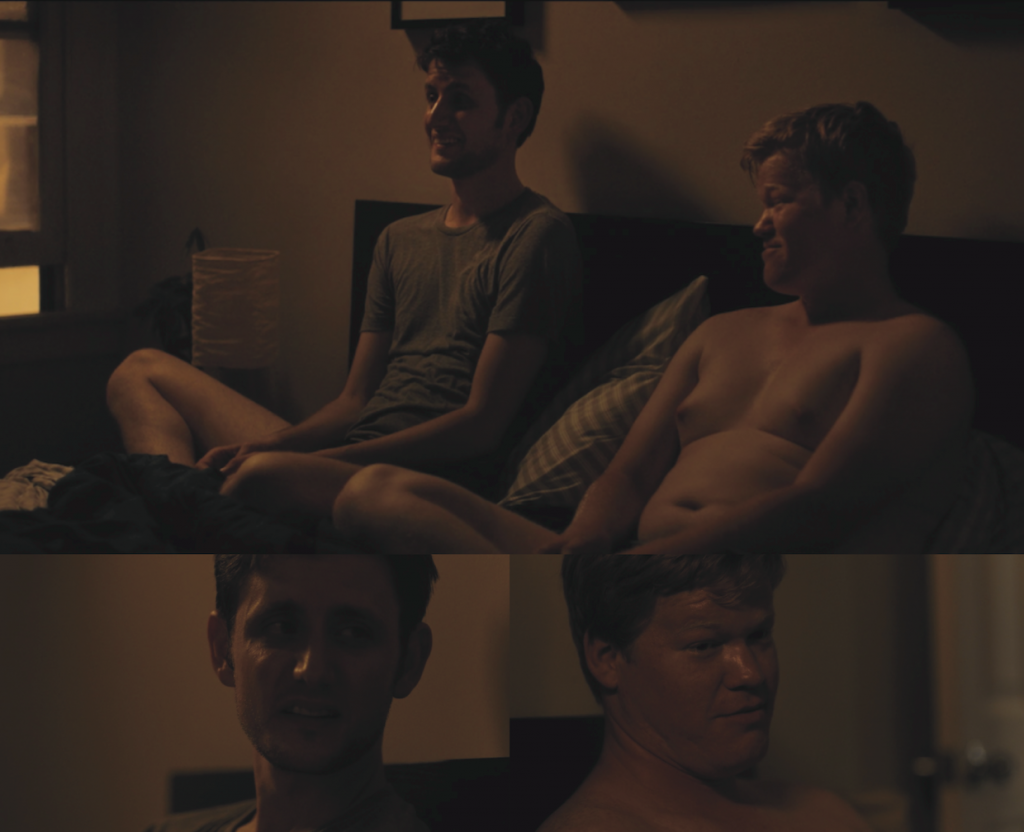 Back to selection
Back to selection
Shutter Angles
Conversations with DPs, directors and below-the-line crew by Matt Mulcahey
“Drops of Jupiter,” Cancer and Blockbuster Video: Chris Kelly on Other People
 Jesse Plemons and Molly Shannon in Other People
Jesse Plemons and Molly Shannon in Other People In the opening shot of Other People, a family gathers around the body of its matriarch seconds after she’s passed from cancer. This moment of grief – accompanied by no score, just sobbing — is punctured when the phone rings and a well wisher leaves a message that is interrupted when the caller pauses to place an order at Del Taco. It’s an appropriate introduction to the film – which is sometimes sad, sometimes funny, but always raw, truthful, and uncannily specific.
That specificity comes from writer/director Chris Kelly’s own experiences during his mother’s final months, during which Kelly — a Saturday Night Live vet currently serving as the show’s co-head writer — returned home to Sacramento to spend time with his family. In the film the surrogate for Kelly is the character of David (played by Jesse Plemons), a struggling comedy writer reeling from a break-up while wallowing in disdain for suburban Sacramento, embodied by the persistent radio presence of Train’s anthemic “Drops of Jupiter.”
With the Independent Spirit Awards looming on February 25th – Other People is nominated in four categories, including Best First Feature — Kelly spoke to Filmmaker about the surreal experience of making a fictional variation of your own life.
Filmmaker: I saw Other People on Netflix within a few days of watching Manchester By the Sea…
Kelly: A very sad couple of days for you. (laughs)
Filmmaker: Yes, it was. (laughs) I loved both of the films but they’re very different. Manchester almost elevates to the level of operatic tragedy, but your film is so understated in its approach to everything – the camera, the score, the performances.
Kelly: It’s loosely based on real-life and one of my biggest thoughts that I had during that time was how boring and stark and brutal the experience was. I had seen a bunch of cancer movies and I had seen a bunch of movies about death and in a lot of those movies there is swelling music and everyone is learning lessons and the experience is elevated to something beautiful. And I just remembered so much of my experience being terrible and sad and lonely and scary. I guess I just wanted to capture what it felt like to really go through it.
Filmmaker: Walk me through putting the script together. You wrote a first draft back in the summer of 2012, after you’d completed your first year as a writer on Saturday Night Live.
Kelly: My first very rough version of it was just 14 full scenes about my experiences that weren’t in any chronological order. I never sent anyone that draft. It was just a step I took to get toward the full movie. I had never written a film before so I wrote a bunch of disparate scenes sort of as a crutch. I wrote without really thinking about the order or how it would all be pieced together. I just wanted to get everything out and not worry about editing myself.
Filmmaker: Jesse Plemons was the first actor on board?
Kelly: Yes, he was the first one. With this kind of indie project there’s no budget [in the early stages] and I started compiling a cast slowly but surely, so that I could present the cast to financiers hoping they would be like, “These are great people. We’ll give you money.” (laughs) Jesse was the first person I met with and he was so gracious and so lovely. He committed to the movie maybe a year-and-a-half before we started shooting and I think his passion about the film really helped make other people in the world see it as real. I had been a fan of his for so long and I was very lucky to have him.
Filmmaker: I haven’t watched Friday Night Lights so I didn’t really know his work until Black Mass. What did you know him from when you first cast him?
Kelly: I knew him from Friday Night Lights and he was in Breaking Bad. Have you seen that?
Filmmaker: No. (laughs)
Kelly: Come on! What are you doing?
Filmmaker: I know. I’m behind on my TV shows.
Kelly: He plays one type of character in Friday Night Lights and then in Breaking Bad he’s this psychopathic villain. And he’s in Olive Kitteridge and the second season of Fargo. Every role he takes on is so different from the role before. He’s very versatile and disappears into his characters. I was floored that he wanted to do our movie.
Filmmaker: And he based some of the physicality of the character on you?
Kelly: He asked if he should base the character on me and I told him he absolutely didn’t have to do that. But I don’t think he’d every been in a position where he was basically playing the person who was directing the movie so he thought it would be helpful to use me — which is a little bizarre on set to notice someone aping what you do. (laughs)
Filmmaker: It’s such a great cast, but I was particularly happy to see Paul Dooley as David’s grandfather. I love him in Sixteen Candles and Breaking Away, but it’s been awhile since I’ve seen him in a film.
Kelly: He’s incredible. I loved his scenes with June [Squibb]. They’re so funny but then they can turn on a dime and be sweet and vulnerable. Truly when the movie first started screening I would watch it with an audience and be like, “I can’t believe so many [great actors] were willing to do this.”
Filmmaker: Once you had Jesse on board and you started rounding out the cast with Molly Shannon and Bradley Whitford as David’s parents, what was the process of getting the movie financed? The list of producers is pretty eclectic — I see the actor Adam Scott and the cinematographer Lance Acord (Lost in Translation, Being John Malkovich) on there.
Kelly: When you’re trying to get the movie made it feels like it’s taking forever, but I was very fortunate in retrospect. I wrote the movie in the summer of 2012 and I probably spent the next year picking at it and punching it up and rewriting it on my off weeks from SNL. Then I probably spent two years trying to get it made — meeting with producers and things like that. When I first met with Adam Scott and [producer] Naomi Scott about the script, that kind of made the movie real. Then they were in charge of helping us get financing and they brought in Park Pictures and everything started to snowball and come together.
Filmmaker: Did you actually shoot near Sacramento or did you just use Los Angeles as a stand-in?
Kelly: We shot everything with the actors in L.A. and then we went up to Sacramento — me, a producer, and our DP Brian Burgoyne — for a day for some establishing shots. But it’s mostly L.A., which stands in for (the scenes in) New York too.
Filmmaker: Since you mentioned your DP, tell me about the film’s aesthetic. It’s largely handheld. In fact, I don’t know if I remember any camera moves in the film.
Kelly: No, there aren’t any. It was all mainly handheld and that went hand-in-hand with my approach to the performances and the music. I didn’t want anything that called attention to itself. And outside of a few [high angle shots] where you get a bird’s eye view of David walking with his mother in the park, almost everything is from David’s point of view.
Filmmaker: The score is very minimal and unobtrusive. In post did you ever throw in temp music just to see how it played?
Kelly: Never. I was in firm opposition to that. I’m not trying to shit on movies that make that choice, but I really hate when I see a truly well performed scene and then music comes in telling me to cry or telling me to be sad. I just thought our actors’ performances were so strong that I didn’t need that extra push to tell an audience, “Now you’re supposed to feel something.”
I never know how to talk about this stuff without sounding too artsy or pretentious, but there’s a scene earlier in the movie where David is talking to a friend about how he is feeling. And it was how I really felt going through this in my life, which was “My mom is dying and I keep waiting for this beautiful moment to happen. I keep waiting to sit on a park bench with my mom and have this beautiful realization. I kept waiting for the voice of God to teach me something gorgeous about this horrible experience.” In that scene the character of David is basically articulating that he’s waiting for the music to swell. He wants this beautiful moment and it isn’t happening. And then at the end the music does swell — but it’s this “Drops of Jupiter” song that’s been haunting him the whole movie. (laughs)
Filmmaker: Is it difficult to clear rights to “Drops of Jupiter” or get permission to shoot at Applebee’s when the movie’s lead character views them as symbols of what he hates about suburbia? The movie itself doesn’t mock them, but the character of David certainly looks down on them.
Kelly: You’re right, David does. But to me there’s a difference between the main character looking down on something and the movie looking down on something. I’m trying to show that David is not necessarily right when he dismisses [his hometown]. Maybe he’s being judgmental and being an asshole. But we didn’t really have trouble clearing the song. We sent the script to Train pretty early on in the process and they really liked it. They understand that the song sometimes gets joked about and they were really supportive of the movie.
Filmmaker: It’s funny that the character of David is your surrogate because I feel like the movie is actually harder on him than anyone else.
Kelly: That’s a good thing, I hope. You don’t want to just write a movie where you’re like this gorgeous perfect hero for 90 minutes — and I obviously don’t think of myself that way. It was an odd experience to write a script where I’m more or less the main character. It does put you in your head a little bit and you have to really think about how you’re portraying yourself. It feels so indulgent and weird. (laughs)
Filmmaker: Tell me about the way you chose to open the film – with the mother passing and the rest of the movie essentially flashing back to unfold the final year of her life. Was that always the first scene even in the early drafts of the script?
Kelly: That was always the first scene. I wanted the movie to start that way for a couple of reasons. For one, I didn’t want the whole movie to be about whether she dies or not. In real life there came a point where my mother had Stage 4 cancer and it was pretty clear that she wasn’t going to survive it. It was a surreal predicament to know that there would be an end, but what do we do until then? How do we make the most of this time? What conversations do we have? What do we ask each other?
And also, just tonally, I wanted to let the audience know the kind of movie they were in for, that this is how the movie was going to work. You’re going to be sad and then it will be funny and vice versa.

Filmmaker: The month marker shots really help you feel that passage of time. Where those always planned?
Kelly: That came in the edit. It seemed to help the immediacy of it. One of the things that I did have in the script from the very beginning were these abrupt hard cuts from scene to scene — like in the New Year’s party scene, where everyone’s counting down and before we get to “one” we hard cut to a month later and the mom is experiencing the effects of chemo and throwing up.
Filmmaker: The family takes a road trip together to New York to see David perform in an Upright Citizens Brigade improv show, during which Shannon gets on stage. Did you shoot that at an actual UCB show?
Kelly: They do these shows a lot at UCB where they with call someone up onto the stage, interview them about their life, and then do an improv show [with that information]. I gave Molly a script with things to say about her character’s life and she told those stories on stage at UCB. But then the improv show that follows was a real improv show. We did maybe an hour show and then edited it down to just a few moments in the movie. The people in the show were all my real friends and real comedians at UCB. So Jesse was [basically playing me] while he was acting with actual people from my life. It was a very bizarre meshing of realities, but it was fun.
Filmmaker: My favorite scene in the film comes right after that improv show, when David is spending the night in New York with his ex-boyfriend [played by Zach Woods]. He tells this story about hiding his porn as an adolescent in this mahogany desk – which was just J.C. Penney catalogues with men in swimsuits. I love the specificity of that scene. Where did that monologue come from?
Kelly: Verbatim from real life. (laughs) That’s a real story from my life. In early free writing, before I wrote the script, I just wrote down all these stories from different periods in my life and some of them made their way into the movie. Basically that scene is a 30-year-old man reflecting on when he was 15-years-old and it shows how self-conscious and terrified he was as a young gay teenager.
Filmmaker: The coverage for that scene is just a master and then one size each for singles. Did you shoot a lot of the dialogue scenes like that with two cameras?
Kelly: We tried to. There were a couple of days where we only had one camera just because our budget was so small. Those days were very rough because I wanted my actors to be able to improvise and I wanted them to be able to rough up the dialogue, but that’s hard to do when you only have one camera [and can’t capture the performances of both actors simultaneously]. But for the majority of scenes we did use two cameras, because a lot of our scenes are very conversational and I wanted the actors to be able to improvise.
Filmmaker: To finish up I have to ask about one random line that really made me laugh. David is at the grocery store and sees an old classmate from high school. This guy wants so badly to help David that he insists on renting him a movie from a Redbox-type machine using his employee discount. And the scene ends with the guy saying, “Is there a non-new release your mom would want to see?” I just found that so funny – that the free movie couldn’t even be a new release.
Kelly: Yeah this guy wants so deeply to help, but his help is so specifically unhelpful and you have to do so much work to allow him to help you. (laughs) That whole scene was based on a real thing that happened to me. [When I was home with my mom] I bumped into somebody at a Blockbuster Video that I went to high school with and he invited me in and was like “Look around and you can rent any non-new release that you want.” I remember just roaming the aisles of Blockbuster Video while he was kind of watching me and I just picked something out so I could get out of there. And we never returned the movie because my mom got sicker. It just sat around our house for the next year and then Blockbuster went out of business.


